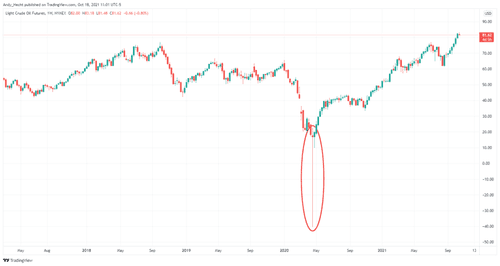Explore the World's Best Ideas
Join today and uncover 100+ curated journeys from 50+ topics. Unlock access to our mobile app with extensive features.
Vanity & Ego
Vanity is excessive pride in or admiration of one’s own abilities, appearance, or achievements. There is a fine line between vanity and ego. Ego is a person’s sense of self-esteem or self-importance.
Vanity may be the devil’s favorite sin, but ego can be a trader's (or investor’s) worst nightmare.
Ego gets in the way of rational, logical, and reasonable conclusions because fear and greed can tug on our egos and cause us to make mistakes.
18
138 reads
Buying The Low
Human nature is a powerful force, but it deludes us to believe our gut instincts. When the price of an asset falls to a level where an investor or trader believes is a logical, reasonable, and rational low, they perceive the price as a bargain.
After an initial purchase, if the price continues to fall, our emotions cause a dangerous impulse. The little voice in our heads (ego) declares that the market is wrong. But it's never wrong.
The quest to buy the low in any market has everything to do with ego and little to do with making a profit.
17
58 reads
Example Of Buying The Low
On April 20, 2020, in the crude oil futures, came to 0$. Who wouldn’t want to buy crude oil at zero? After all, what is the risk?
As the history shows, a purchase of the expiring futures contract at zero looked more than ugly at negative $40 per barrel, the April 20, 2020 low.
17
60 reads
Selling At All Time High
Shorting an asset has the same ego dynamics. The market can take prices to levels on the up and downside that defy logic, reason, and rational analysis. There are many instances where prices rise to levels that make no sense.
Selling short and ignoring the power of the trend is dangerous and could be disastrous. Just because a market price rises to a high, does not mean it cannot go higher, a lot higher.
17
43 reads
Example Of Selling At ATH
The annual chart of wood price has never traded over $493.50 per 1,000 board (1993 ATH) before 2017.
After falling to a low of $251.50 in early 2020 as the global pandemic gripped markets across all asset classes, the price took off on the upside.
At $660 in August 2020, it reached a new record high.
At $1,000 in September 2020, the price was irrational, and it more than halved in value, reaching a low of just over $490 in October 2020.
In May 2021, the price exploded to $1711.20 per 1,000 board before collapsing.
17
37 reads
Follow The Trend
Following trends requires a special skill, which is no skill at all. Ignore expert advice, the news, and any other exogenous forces. The only tool necessary is a simple chart that displays the path of least resistance of the price.
The process is entirely objective, while fundamental analysis is completely subjective.
James Surowiecki argues that the many are smarter than the few and collective wisdom shapes business, economies, societies, and nations. A price chart is the roadmap of the crowd’s wisdom.
17
46 reads
Suppressing Emotions are Harder Than You Think
Eliminating ego from all investment and trading decisions starts with ignoring the news, experts, and any inputs other than the herd behavior in markets.
Prices rise & fall to levels that many believe are not sustainable, following trends allows you to take advantage of their mistakes. Make a conscious decision that you will end the quest to pick a high or low in any market.
Ignore those voices in your head that appeal to your ego. Never forget that your view has no relevance whatsoever. Approach markets with a clear risk-reward plan.
18
42 reads
IDEAS CURATED BY
Passionate about crypto Trading since 2015 M.Sc. Chemical engineering Soon Ph.D. Computer science
Ali E.'s ideas are part of this journey:
Learn more about psychology with this collection
Identifying and eliminating unnecessary expenses
How to negotiate better deals
Understanding the importance of saving
Related collections
Similar ideas
4 ideas
Heikin-Ashi: A Better Candlestick
investopedia.com
7 ideas
Getting Your Investing Sails right Before You Go to Sea: 11 Fundamental Concepts
informationprime.wordpress.com
2 ideas
Time in the Market versus Timing the Market
wilsonsadvisory.com.au
Read & Learn
20x Faster
without
deepstash
with
deepstash
with
deepstash
Personalized microlearning
—
100+ Learning Journeys
—
Access to 200,000+ ideas
—
Access to the mobile app
—
Unlimited idea saving
—
—
Unlimited history
—
—
Unlimited listening to ideas
—
—
Downloading & offline access
—
—
Supercharge your mind with one idea per day
Enter your email and spend 1 minute every day to learn something new.
I agree to receive email updates
